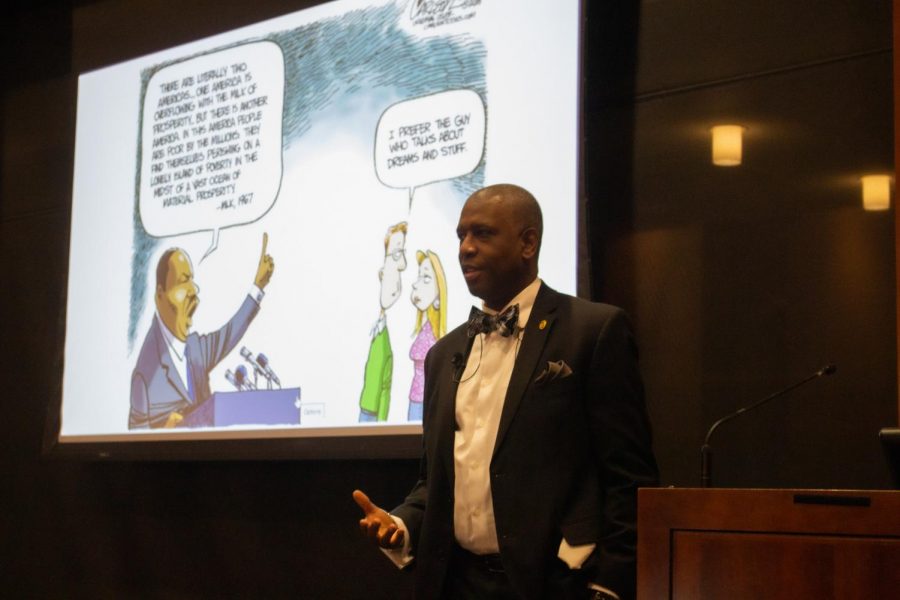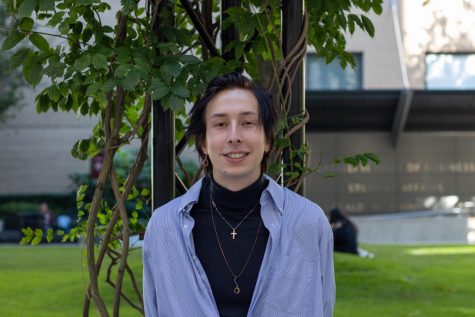Fordham Commences ‘Radical King Week’
JOE KOTTKE\THE OBSERVER
Dr. Arto Woodley, executive director of the Center for Community Engaged Learning, discusses the legacy of Rev. Dr. Martin Luther King Jr. at diversity event.
January 22, 2020
To honor Martin Luther King Jr. Day, Arto Woodley, Ph.D., executive director of the Center for Community Engaged Learning, lectured on the Rev. Dr. Martin Luther King Jr.’s life and legacy. The Jan. 21 event commenced “Radical King Week” on the Fordham Lincoln Center campus.
Chief Diversity Officer Rafael Zapata helped develop the week’s theme with the hope of fully representing King’s legacy. As Woodley noted in his speech, “When you think of King, you think of the ‘I Have a Dream’ speech; we don’t look at what his words really meant.”
In the past year, Fordham has worked to develop initiatives surrounding inclusion, diversity and equity. That, coupled with an 18% increase of black students enrolled at Fordham College at Lincoln Center (FCLC), led to a more coordinated attempt to celebrate Martin Luther King Jr. Day.
Woodley centered his lecture on King’s final book “Where Do We Go From Here: Chaos or Community?” The book was published in 1967, when King developed his positions on racial inequality to also include socioeconomic status. “King discovered the battle was not just between black and white, but between the haves and have-nots, which sparked his poor people’s campaign,” Woodley said.
King cited racism, consumerism and militarism as negating the war on poverty. “King talked about poverty and how African Americans amassed power from an ideological, educational and economic standpoint,” Woodley explained.
One lecture attendee, Devin Deane, a graduate student at the NYU Silver School of Social Work, said that he enjoyed the lecture because it went beyond the conversations usually found in classrooms and explored radical shifts. “King understood that the civil rights movement did not end with eliminating segregation but moved into economic justice and fulfilling the ideals that America promised to all people,” he said.
Woodley said that nonviolent resistance was just the beginning of the civil rights movement, though that is often the extent of teachings on King. “When we think about leaders in the civil rights movement, we put them into a bubble as ‘nonviolent’; we don’t look at their growth as leaders,” Deane said.
Woodley said that King had a revolutionary approach to leadership, community and love. King also believed in sacrificial leadership and was a “radical listener.”
At the end of the lecture, Woodley answered questions from the audience, pushing his listeners to be “bridge builders” by intentionally making relationships with different people. “In academic settings, we are good at talking, but we don’t take action,” Woodley said.
The small audience began their discussion by talking about the importance of developing a dedicated and committed community. “Although this isn’t a packed room, it’s an energetic room; it takes a group of committed people to make change,” Zapata said.
Lecture attendee Jayden Doan, FCLC ’22, expressed an interest in engaging in community work at Fordham, but wished the event’s attendance was higher. “I loved the lecture, but I was very disappointed in the turnout. I went to MLK events at Rose Hill last year and the room was packed with community leaders, faculty and students,” she said.
Woodley’s lecture is the week’s first event, to be followed by student-organizing workshops and additional speakers, including Janaya Khan, co-founder of the Black Lives Matter movement, on Jan. 23.
Zapata, who is in his third year of serving as Chief Diversity Officer, is already planning next year’s events. He said he will ask for input from the Fordham community and is exploring possibilities of renaming the week “Justice Week.”
“Our goal is to organize events for people to come together to hear, engage and reflect,” Zapata said. “You discover who else cares about the issue; we want to convene the community around shared values and our mission.”
Elizabeth Hinton, author of “From the War on Poverty to the War on Crime: The Making of Mass Incarceration in America,” is already scheduled to speak next year. Zapata said he also wants to plan a film screening of “Decade of Fire,” a 2018 documentary chronicling the fires in the Bronx throughout the 1970s.
Zapata reaffirmed Woodley’s placement of importance on action. Woodley closed by saying, “If you don’t take the words and experiences that King left and you don’t make a difference, then was it just a dream?”











